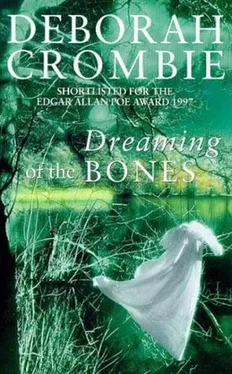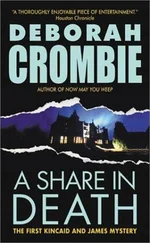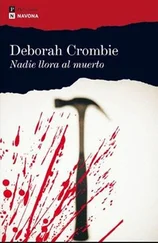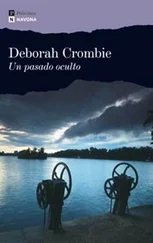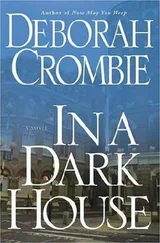Deborah Crombie - Dreaming of the bones
Здесь есть возможность читать онлайн «Deborah Crombie - Dreaming of the bones» весь текст электронной книги совершенно бесплатно (целиком полную версию без сокращений). В некоторых случаях можно слушать аудио, скачать через торрент в формате fb2 и присутствует краткое содержание. Жанр: Детектив, на английском языке. Описание произведения, (предисловие) а так же отзывы посетителей доступны на портале библиотеки ЛибКат.
- Название:Dreaming of the bones
- Автор:
- Жанр:
- Год:неизвестен
- ISBN:нет данных
- Рейтинг книги:3 / 5. Голосов: 1
-
Избранное:Добавить в избранное
- Отзывы:
-
Ваша оценка:
- 60
- 1
- 2
- 3
- 4
- 5
Dreaming of the bones: краткое содержание, описание и аннотация
Предлагаем к чтению аннотацию, описание, краткое содержание или предисловие (зависит от того, что написал сам автор книги «Dreaming of the bones»). Если вы не нашли необходимую информацию о книге — напишите в комментариях, мы постараемся отыскать её.
Edgar Awards (nominee)
Macavity Awards
Dr Victoria McClellan is writing a biography of the tortured poet Lydia Brooke, five years after Brooke's tragic suicide. Victoria becomes immersed in Lydia's life – she cannot believe the poet died by her own hand. So she calls her SI ex-husband for help in the case who receives terrible news…
Dreaming of the bones — читать онлайн бесплатно полную книгу (весь текст) целиком
Ниже представлен текст книги, разбитый по страницам. Система сохранения места последней прочитанной страницы, позволяет с удобством читать онлайн бесплатно книгу «Dreaming of the bones», без необходимости каждый раз заново искать на чём Вы остановились. Поставьте закладку, и сможете в любой момент перейти на страницу, на которой закончили чтение.
Интервал:
Закладка:
“Daphne’s a very private person, as was Lydia. When Lydia died, Daphne asked me to return all the letters she’d written to her over the years. I saw no reason not to.”
After a moment, Vic realized she was gaping and snapped her mouth shut. “But couldn’t you have… But what about-”
“Literary posterity?” Nathan supplied helpfully. “I rather thought that the wishes of the living people involved came first.”
Vic stared at him for a moment, then gave a deflated sigh and rubbed her cheekbones with the tips of her fingers. “You’re right, of course. You couldn’t in good conscience have done anything else.” She shook her head. “What’s happened to me? Am I turning into some sort of dreadful vulture?”
Nathan grinned at her. “Next thing you know you’ll be applying for a job on The Sun.”
“God forbid I should come to that,” Vic said, smiling back in spite of herself. “But, oh, Nathan, I was so ignorant when I took this on. I actually thought that biography was an academic and critical pursuit-can you imagine that? But it’s as much fiction as any novel. How else can you create a whole person out of the bits and pieces we leave behind? And where do you draw a morally defensible line as far as privacy is concerned, for both the living and the dead?”
“I don’t know, my dear,” said Nathan, all trace of levity vanishing. “But I trust your judgment. And I think if you are going to be happy with yourself, you’re going to have to trust your judgment, too. And don’t be afraid to follow your instincts, else you might end up fat and self-satisfied. What was it that Rupert Brooke advocated to his friends? That they should all live together in licentious freedom on an island, then kill themselves when they reached middle age?”
“You’re not fat or self-satisfied.”
“Vic-”
She interrupted him, intent on following her train of thought. “All right, then, what am I missing about Daphne? In Adam, I caught the occasional glimpse of what Lydia must have seen, but I couldn’t imagine Daphne had ever been anything but a middle-aged and very proper headmistress.”
“For starters, Daphne was anything but proper,” said Nathan with a glint of amusement. “And she was gorgeous. They both were, but in different ways. Daphne could have posed for any number of mythical or biblical paintings-you know, Rape of Lucretia sort of thing. She had that timeless, feminine, corn goddess quality, all heavy breasts and flowing copper hair.” He paused, then said more slowly, “While Lydia-there was something more androgynous about Lydia, with her slender body and her triangular, almost feline little face-but she was no less appealing for that. And she certainly made up for any sexual aggressiveness that Daphne lacked,” he added, as if it were an afterthought.
Frowning, Vic said, “But I thought… that it was always you and Daphne. And Adam and Lydia. I mean…”
“Are you trying to be tactful, Vic?” Nathan asked, the veiled amusement evolving into a wicked grin. “I’d never have thought it of you.”
She felt herself blushing and said defiantly, “All right, then. Are you telling me that you slept with them both?”
“You must remember that this was, after all, the early sixties, and that we thought we had invented it all.” His tone was still teasing, but the laughter had gone from his eyes. “It all seemed so daring and liberated, and we were so smug with it.”
“You don’t sound as if you enjoyed it much.”
“I was… what? Nineteen? Twenty? I’m not sure enjoyment is the operative word with males at that age. It’s a bit more basic than that.”
Vic tried to imagine Nathan as he had been then, but his presence now was too real, too strong. She found the thought of him making love to Daphne and Lydia surprisingly arousing, and found also that it gave her an odd sense of connection to the two women. She would have to see Daphne again. And she would certainly have to revise her picture of Lydia’s university days, which up until now had been gleaned mostly from Lydia’s early poems and the oh-so-innocent letters to her mother. “Nathan,” she said as she slid from her chair and positioned herself at his feet, her chin resting on his knee, “tell me what it was really like.”
He stroked her hair. “Maybe when you’re older.”
“No, seriously.” She looked up at him. “I need to know.”
“Seriously,” he countered, “I will. But not tonight. It’s getting late and I’m afraid you’re going to turn into a pumpkin.”
“Not until you’ve taken off my glass slippers,” Vic said, and smiled.
Newnham
29 April 1963
Dear Mummy ,
Oh, glorious, glorious red-letter day. Now I truly understand the expression for the first time .
Flying back from afternoon lectures with the sun shining and the east wind nipping my face, there was the post in my box in the JCR. Sorting the letters as I climbed my staircase, I saw the familiar envelope at the bottom of the stack .
There is a necessary ritual for these things. The sanctuary of my room, and the putting away of books, and the making of a cup of tea, and then the paper knife. I saved the magazine’s envelope till last-I always save them till last-and opened it with only half my attention. I was thinking of the paper I’m writing on some obscure eighteenth-century poets, and doing a fairly good job of ignoring the knot that always forms in my stomach, more dread than hope. But finally, I slit the envelope with razor neatness, unfolded the very ordinary letter, and carefully smoothed out the creases, and had no further excuse for delay .
“What an odd rejection,” I thought as I read, then had to read it over twice more before the words penetrated .
I’ve sold not just one poem, but three! And to Granta, no less. ‘The Huntsman,’ and ‘The Last Supper,’ and ‘Solstice.’ And they like the English myth series (’Huntsman,’ ‘Solstice’) so much that they want to see the rest .
How is it possible to feel numb and ecstatic at the same time? Haven’t told anyone yet, not even Daphne, as I wanted you to be the first to know .
I realize you’ve been concerned for me these last few months, but I seem to have got over the sticky patch, and the sale of the poems confirms to me that I have been going in the right direction all along. I have to admit I had doubts this last winter, wondering whether I had the courage and the stamina to succeed as a poet, and the truly awful thing about it was not being able to imagine doing anything else .
But it seems that I have made a beginning, and now I must live up to it .
Your loving
Lydia
The front door creaked and Vic looked up from her desk, listening. She glanced at the clock. It must have been the wind, she thought-she had half an hour yet before Kit should be home from school.
When the second supervision of her Monday afternoon schedule had canceled due to flu, she’d taken advantage of the opportunity to come home early and put in an extra hour’s work. She’d cleared a space on her desk and laid Lydia’s manuscript pages out like pieces in a jigsaw puzzle, shuffling and reshuffling the order of the poems.
That they were good she had no doubt-brilliant, even-a final step in the evolution of Lydia’s work. The poems reached back, integrating elements from her early, mythically themed poetry with the later confessional style, and in doing so achieved a new balance. And when these missing poems were added to the ones published in her last volume, the book gained a wholeness, a sort of unity not evident in her work before.
Читать дальшеИнтервал:
Закладка:
Похожие книги на «Dreaming of the bones»
Представляем Вашему вниманию похожие книги на «Dreaming of the bones» списком для выбора. Мы отобрали схожую по названию и смыслу литературу в надежде предоставить читателям больше вариантов отыскать новые, интересные, ещё непрочитанные произведения.
Обсуждение, отзывы о книге «Dreaming of the bones» и просто собственные мнения читателей. Оставьте ваши комментарии, напишите, что Вы думаете о произведении, его смысле или главных героях. Укажите что конкретно понравилось, а что нет, и почему Вы так считаете.
